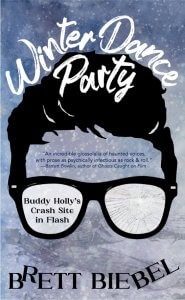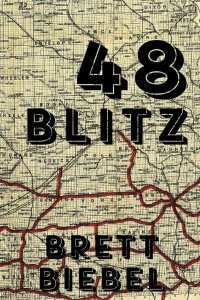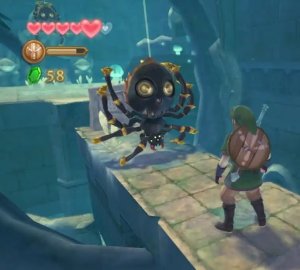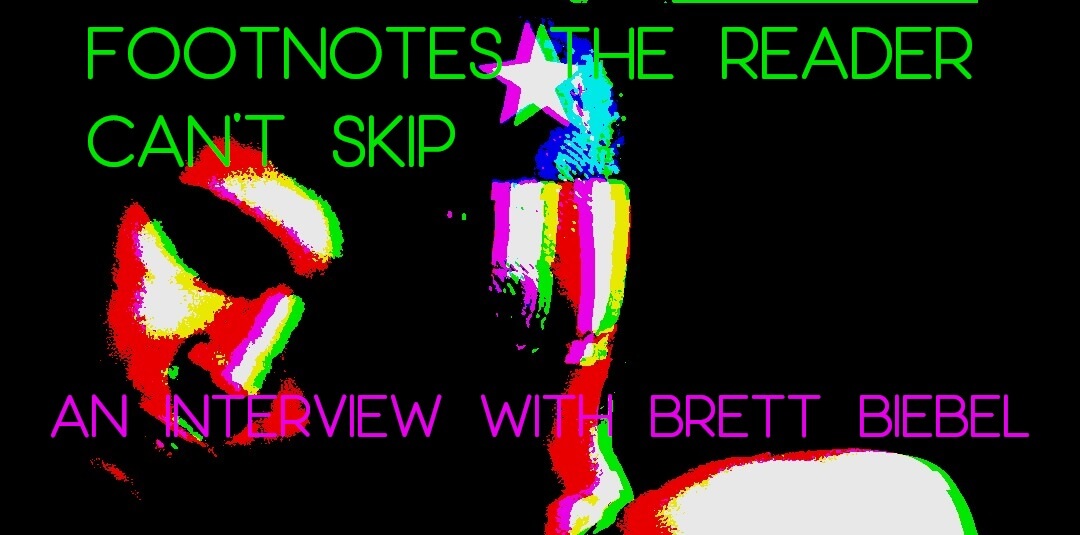 Brett Biebel’s fiction reminds me, affectionately, of Six Flags. Specifically, Six Flags after one too many beers. To read his (very) short stories is to ride a rollercoaster: there are dips, plunges, swerves, loops, flips. Each is its own specific ride, and it can be tricky at times to tell which way is up. But when each story inevitably crests, jackknifing you into sky, they allow you to see the world and its horizon with breathtaking clarity.
Brett Biebel’s fiction reminds me, affectionately, of Six Flags. Specifically, Six Flags after one too many beers. To read his (very) short stories is to ride a rollercoaster: there are dips, plunges, swerves, loops, flips. Each is its own specific ride, and it can be tricky at times to tell which way is up. But when each story inevitably crests, jackknifing you into sky, they allow you to see the world and its horizon with breathtaking clarity.
In the case of his new collection, Winter Dance Party, that world is Clear Lake, Iowa, the site of Buddy Holly’s plane crash and home to a colorful myriad of characters. I had the privilege to write back and forth with Biebel about dead celebrities, the underbelly of nostalgia, and how these stories come together to paint a beautiful, complicated picture of the Midwest.
 Jessika Bouvier: At the risk of showing my age, I have to admit that before reading Winter Dance Party, most of my knowledge about Buddy Holly came from the eponymous Weezer song – which is to say, I knew nothing. I’m interested in how you feel this flash collection fits into the lore of what happened on that day in 1959; did you intend for your audience to keep the crash and/or the legacy of Buddy, Ritchie, and The Big Bopper front of mind while reading?
Jessika Bouvier: At the risk of showing my age, I have to admit that before reading Winter Dance Party, most of my knowledge about Buddy Holly came from the eponymous Weezer song – which is to say, I knew nothing. I’m interested in how you feel this flash collection fits into the lore of what happened on that day in 1959; did you intend for your audience to keep the crash and/or the legacy of Buddy, Ritchie, and The Big Bopper front of mind while reading?
Brett Biebel: It’s funny you mention the Weezer song, which definitely gets a shoutout in the collection! Prior to writing the book, most of my impressions of the “Day the Music Died” came from the Don McLean song. That’s part of what fascinated me about the crash. It’s really a foundational American myth, and the stories we tell about it cast a big shadow over the facts of the event itself. Maybe that’s how history always is. In the case of Clear Lake and the crash site, though, the distance between the reality and the myth is readily apparent. Clear Lake has a gorgeous lake, and the Surf Ballroom is incredibly cool, but, otherwise, it’s really just this regular, kind of worn-down small town. The crash site is like that too. Out of the way, a little bit creepy, kind of hollow and empty and rough.
As I was writing, I just kept thinking how it was only a matter of time before someone tried to profit from bringing the reality into better alignment with the myth. Or, at least creating a land where myth was the only thing there was. That’s a question I’m obsessed with. What’s the relationship between reality/life/history and stories? When do stories productively enrich our lives, and when do they overtake them to a troubling degree? The “Day the Music Died” is just a great case study for someone trying to figure that out.
JB: You segmented Winter Dance Party into three distinct sections, each dedicated to one of the aforementioned musicians that died in the plane crash. What was your process of distributing stories between those three sections? Did you have a central mood or pathos in mind for each section?
BB: All three musicians definitely have a distinct legacy. All I really knew was that I wanted to put “The Big Bopper” last because he always felt like the guy people talked about the least. So much of the book is about forgotten parts of the Midwest, so I kind of wanted to start unifying and wrapping up threads and providing that fictional catharsis around the “third wheel,” I guess. Ritchie Valens was the youngest of the three, so “youth” was kind of the idea I was thinking of for that section. That’s where a lot of the prankster stories come in, the playful stories, the kids dancing to “La Bamba” and generally just doing fucked-up shit.
The “Buddy Holly” section felt the most detached from the musician himself. He always seemed like the focal point of the crash, so that section was largely about establishing the frames of the collection, introducing the crash sites, highlighting some of the major throughlines, etc.
 JB: More than to the musicians themselves, this collection felt like a colorful love letter to the Midwest. Your previous collection, 48 Blitz, is rooted in the same region and wrestles with the often harsh (but equally tender) circumstances that can define much of rural life in America. I’m curious how different writing felt for you in the making of WDP versus 48 Blitz.
JB: More than to the musicians themselves, this collection felt like a colorful love letter to the Midwest. Your previous collection, 48 Blitz, is rooted in the same region and wrestles with the often harsh (but equally tender) circumstances that can define much of rural life in America. I’m curious how different writing felt for you in the making of WDP versus 48 Blitz.
BB: It means a lot to hear you say that. Yeah, at a certain point, I think this collection tries to get out of the shadow of the crash and allow the reader to see the characters for who they are. I think all collections strive for that to some degree, providing a thematic frame that you can start to crawl out from under carefully as you go along, as if you’re checking the weather outside. Then, suddenly, there you are in full sun.
In terms of the difference between the two collections, Winter Dance Party feels darker to me. The institutions present in the book are really asserting authority over the characters, and the avenues for resistance or redemption or fulfillment are a lot narrower. Maybe part of that has to do with the difference between Iowa and Nebraska, where 48 Blitz is set. Maybe it sounds weird since I know people associate Iowa with empty cornfields, but Nebraska just feels like a more iconoclastic, individualistic place to me. Having lived in Iowa for nearly a decade, it just seems beholden to more of those Midwestern mores, and I think that’s reflected a little in the collection.
JB: The tether between these 59 stories felt both solid and ephemeral. While reading, I had the recurring thought that they were tied together with spiderwebs: barely there but offering structure all the same. As someone who spent swaths of their teendom in a small town, I loved how images or motifs would reappear throughout the collection in a way that felt true to the ever-churning rumor mill in tiny communities, creating a de-facto link between the stories. The bed bugs in “Midnight Shift” and “Great American Vacation,” and the recurring dead celebrity parties were some of my favorites. I noticed recurring characters, too – McQuaid and Fillmore and Palacios and the porn-star-with-many-names-but-most-often-Laramie – but I wondered how concretely the characters in this community appeared to one another. Or did you intend for the link between the stories to be more impressionistic?
BB: Such a great question. The great virtue of flash fiction is that it’s so immersive. I always feel like it’s a pharmaceutical medium — you’re after the biggest impact at the lowest dosage. Any flash collection wants to keep this quality, but there’s also the need to sustain momentum, and it’s really hard to just keep turning the temperature up over 40, 50, 60 stories.
 The spiderwebs idea really speaks to me. I haven’t thought of it in those terms, but that’s definitely part of the goal. It’s almost like The Legend of Zelda or something. Setting is always a backbone for me, and I try to achieve some narrative momentum by letting the reader wander around in a concrete one. You see one slice at a time, but hopefully that slice is compelling enough to make you wonder how it connects to others and how this world gets along with itself.
The spiderwebs idea really speaks to me. I haven’t thought of it in those terms, but that’s definitely part of the goal. It’s almost like The Legend of Zelda or something. Setting is always a backbone for me, and I try to achieve some narrative momentum by letting the reader wander around in a concrete one. You see one slice at a time, but hopefully that slice is compelling enough to make you wonder how it connects to others and how this world gets along with itself.
I do think these characters know each other, if only through communal stories. This is something that’s true to my small-town experience. You get to know people as much through what people say about them (for better and worse) as through your personal interactions with them.
JB: I can’t not ask a style question: the parentheticals! They were such a hallmark. I’d love to learn more about how they made their way into your style, if there is an implicit linguistic commentary there, and how they’ve developed through the writing of WDP.
BB: You always worry a distinctive style choice starts to feel like a self-parody after a while. In my more insecure moments, I do get a little freaked out by the intensity of the parentheticals. But that’s really just the way a lot of those stories come out. It helps me make the stories feel richer in my brain, and it’s a way to activate the reader a little bit. Flash feels at its best when it’s presenting multiple, co-existing and sometimes competing moments or perspectives. It’s so much about asking the reader to inhabit multiple emotional landscapes at the same time, and the parentheticals reflect that for me. They add contingency and uncertainty and constantly call attention to the process of making meaning out of the story. And they usually show up in the more conceptual stories, the ones from institutional perspectives. I think it’s a way for me to keep the idea of the piece front and center (whether that’s an AI president or a bizarre marketing plan) while also exploring multiple layers of its consequences, all in a relatively short story. Plus, they almost serve as footnotes the reader can’t skip, which I like for reasons that are unclear even to me.
JB: Every good story has a villain, and the villain throughout WDP is a development company hellbent on commercializing the site of Buddy Holly’s plane crash. Morphing tragedy into commercial amusement is not rare in the U.S., nor is it a strange premise in the world of American short stories – I often think back to Nana Kwame Adjei-Brenyah’s “Zimmer Land” as doing this so well. But the stories in WDP feel like they stop just before crossing the line into commentary that could be considered overtly political, often spurring instead into a more absurd, comedic place (see: bed bug suite). In terms of it being a region historically exploited for its resources – manpower or otherwise – I’d love to hear you speak more about how politicization and Midwest life are entangled, and what the stories in WDP have to say about that.
BB: Oh, “Zimmer Land” is great! I’m sure I’ve seen George Saunders do that too. And you’re so right that it is such a fine line making a story or a collection political without making it feel shallow or preachy. To me, I always feel like I want something political but not partisan. That’s really hard to do in such a polarized era, but the strength of flash (and literature in general) is its ability to create ambiguity. So, the challenge is accepting the perspective of a  particular story and then trying to present that perspective in the most complex way possible. A collection about Iowa cannot avoid the fact that the state has, over the course of the last 15 years, gone from being pretty darn progressive to being a bastion of Trumpism. I certainly think this collection cares about that. The “Day the Music Died” is itself kind of wrapped up in ideas of 1950s nostalgia and a longing for a past that was often really ugly. Many of the characters in this book have wholesale bought into destructive myths about masculinity, for example. A lot of them are casually misogynist. At the same time, the decline of the Midwest is real. Drug abuse, the corporate takeover of farming, general lack of interest or concern from big cities and seats of government, all of that is pretty plain to anyone who spends time hanging out within a few miles of cornfields and cow pastures. I hope the collection doesn’t shy away from the problematic attitudes of some of its characters. I also hope it asks the reader to confront difficult questions about the fact of modern life, which is that systems of power are unreachable and often abusive. How do we deal with that? Some ways are better than others, and I think part of the writer’s job is to force the reader to sort out the yin and yang of ugliness and nobility.
particular story and then trying to present that perspective in the most complex way possible. A collection about Iowa cannot avoid the fact that the state has, over the course of the last 15 years, gone from being pretty darn progressive to being a bastion of Trumpism. I certainly think this collection cares about that. The “Day the Music Died” is itself kind of wrapped up in ideas of 1950s nostalgia and a longing for a past that was often really ugly. Many of the characters in this book have wholesale bought into destructive myths about masculinity, for example. A lot of them are casually misogynist. At the same time, the decline of the Midwest is real. Drug abuse, the corporate takeover of farming, general lack of interest or concern from big cities and seats of government, all of that is pretty plain to anyone who spends time hanging out within a few miles of cornfields and cow pastures. I hope the collection doesn’t shy away from the problematic attitudes of some of its characters. I also hope it asks the reader to confront difficult questions about the fact of modern life, which is that systems of power are unreachable and often abusive. How do we deal with that? Some ways are better than others, and I think part of the writer’s job is to force the reader to sort out the yin and yang of ugliness and nobility.
 JB: Are there any parts of your work, be it your process or the content itself, that you love to talk about but don’t often get to because people don’t think to ask?
JB: Are there any parts of your work, be it your process or the content itself, that you love to talk about but don’t often get to because people don’t think to ask?
BB: Do other flash writers get inspired by rock n’ roll? I love reading and watching great drama in all kinds of forms, but pop music is often the most reliably inspirational. There’s nothing like a great songwriter. In a lot of ways, I think this collection might be an ode to that. The stories that get told in the best songs feel like flash stories. They pull you in and don’t let go, and you’ll listen to them again and again and find something new every single time.

